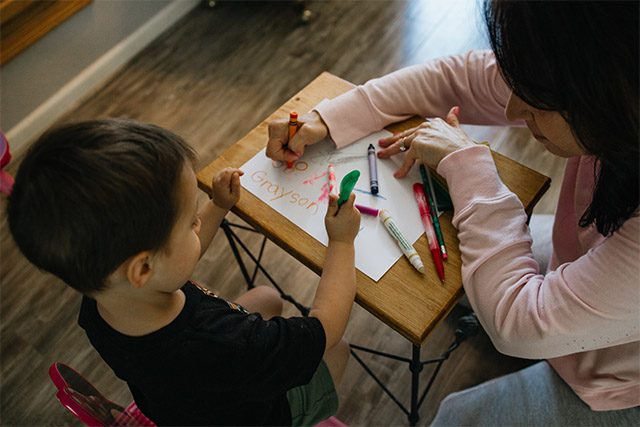Pupils in many countries will be returning to the classroom in September after a significant break from being in a typical school environment. They will also be facing the upheaval of a new school year.
The process of transition – moving from one class to another, such as from year one to year two, or from primary to secondary school – can have a significant impact on children. This year, they also have to deal with the effects of a global pandemic.
Our recent research has looked at good practice in supporting children and young people in these transitions. Many children are anxious or nervous about beginning in a new class or school.
By speaking with learners, parents and teaching staff we have be able to identify what those concerns are and what can be done in school to help alleviate them. Of course, this year, understanding how this change can affect children is particularly important thanks to COVID-19.
Individual experiences
Our study explored experiences of transition in primary school by listening to the voices of individuals involved in the process: teachers, parents and children. We spoke with 16 teachers (primary school teachers, heads of year and special needs coordinators), interviewed 30 children in focus groups and distributed 150 questionnaires to parents and caregivers.
Transition, if not managed carefully, can affect a child’s social and emotional development, potentially with long lasting educational implications. It can mean that they struggle interacting with peers and teachers socially, and do less well academically.
It is important to consider the impact of this change upon individuals and to tailor approaches where necessary to ensure that children feel supported during this process. This is particularly important now, as children may feel increasingly distanced and detached from school as a result of the lockdown.
The children in our research mentioned concerns which included being able to find their way around the new setting, making friends, meeting new teachers and coping with school work.
This year, parents, teachers and children may have particular concerns with about the health and safety of children in school, the potential of disrupted schooling and the impact this will have on children settling into school.
For children moving from one class to another, a process of familiarization should usually start at the end of the previous school year, and include moving up days – where pupils spend time in the new classroom or secondary school – starter packs with information about the setting or class, and meetings with the new teacher.
However, the pandemic will have disrupted these activities. Schools have compensated by using online methods such as key teachers introducing themselves on film, opportunities for virtual visits of the new setting, and virtual question and answer sessions.
Tailoring the support provided in the transition process is particularly important for children with special educational needs. For example, children nervous about finding their way around a busy setting could, if possible, visit the school at the end of the school day when it is quieter. Further visits to meet individual teachers working with the learner can also be organised.
Supporting children
For any transition, whether starting school for the first time or moving from one school year to another, good communication and understanding the needs of everyone involved is very important. Teachers should talk to parents and caregivers about the move into a new class, as this means parents can reinforce positive messages to children about their new school environment.
Parents need to listen to their children, giving them opportunities to discuss the return to school – what they are looking forward to as well as what they might be concerned about. This will be particularly important this year, and children should feel confident to express thoughts and feelings about school with their teacher and parents.
This should be an ongoing conversation after the school year has started so that if any issues arise during the first days and weeks, they can be discussed openly and any persistent problems can be discussed with the school. School staff need to listen to parents and pupils during the transition process.
Before returning to school it is important that children are prepared. Parents can ensure this in practical ways, such as by buying and labeling school uniform, shoes and stationary so that their children have all the right equipment before they start.
Teachers are responsible for making sure children are comfortable in their new surroundings and are able to develop meaningful relationships and communicate effectively. When schools return, learners may not have been in school education for some time.
It would be useful for teachers to provide extra guidance and support to new learners in their new environment, to give an opportunity to familiarize themselves with the setting and develop a sense of belonging.
With the effects of the pandemic, it will be particularly important to allow children time and space in school to become more familiar with their new environment. Teachers should also make sure to provide opportunities for friendships to develop within the classroom environment.
Our research found that new parents welcomed opportunities to make contact with teachers, at information evenings and by using social media. We found that teachers were receptive to the needs of learners, reflected upon their transition activities and amended as necessary. This school year, this flexibility is bound to be more important than ever.![]()
Rhiannon Packer, Senior Lecturer in Additional Learning Needs, Cardiff Metropolitan University. This article is republished from The Conversation under a Creative Commons license. Read the original article.










